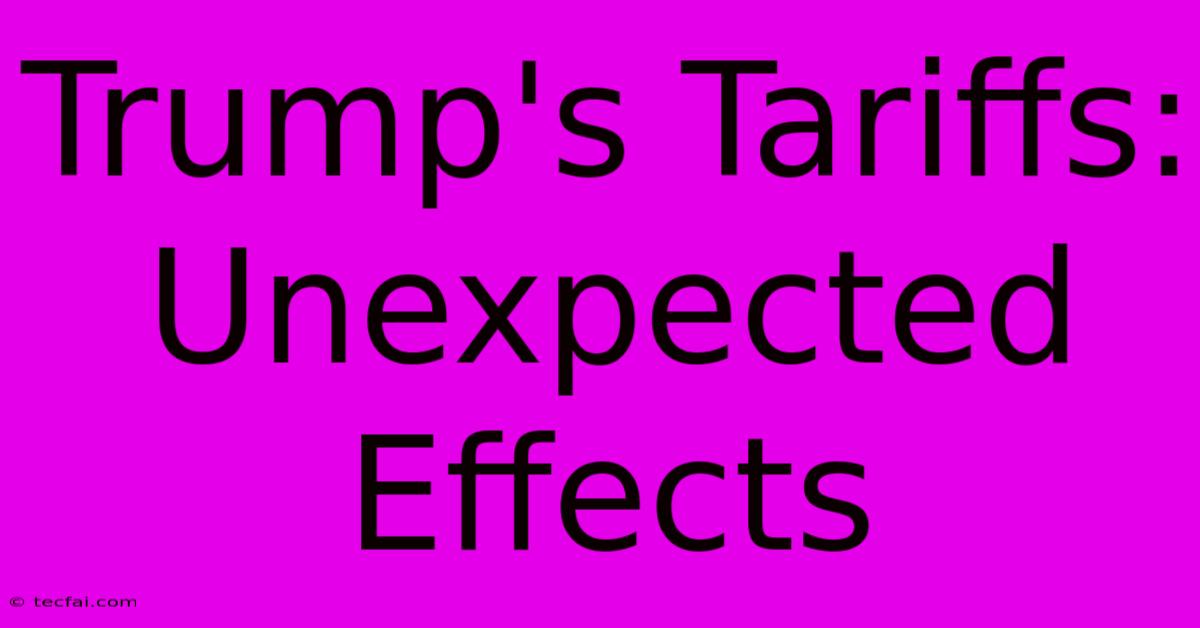Trump's Tariffs: Unexpected Effects

Discover more detailed and exciting information on our website. Click the link below to start your adventure: Visit Best Website tecfai.com. Don't miss out!
Table of Contents
Trump's Tariffs: Unexpected Effects on the Global Economy
Donald Trump's presidency was marked by a significant trade policy shift: the imposition of tariffs on various imported goods. While the stated aim was to protect American industries and jobs, the actual effects rippled far beyond initial expectations, creating a complex web of economic consequences. This article delves into the unforeseen and often counterintuitive impacts of Trump's tariffs.
Initial Goals vs. Actual Outcomes: A Disparity
The primary objective behind the tariffs was to reduce the US trade deficit and bolster domestic manufacturing. Trump argued that these measures would level the playing field, forcing other countries to negotiate fairer trade deals. However, the reality proved far more nuanced and, in many cases, contradicted the intended outcomes.
Unexpected Consequence #1: Inflationary Pressures
One significant unintended consequence was a surge in inflation. Tariffs increased the cost of imported goods, leading to higher prices for consumers. This inflationary pressure impacted various sectors, from automobiles and steel to everyday consumer products. While some might argue this boosted domestic production, the negative impact on consumer purchasing power ultimately hindered overall economic growth.
Unexpected Consequence #2: Retaliatory Tariffs and Trade Wars
The imposition of tariffs inevitably triggered retaliatory measures from other countries. China, the European Union, and other trading partners responded with their own tariffs on American goods, leading to a series of trade wars. This tit-for-tat escalation harmed American exporters and disrupted global supply chains, demonstrating the interconnectedness of the world economy. The expectation of a quick win for the US never materialized; instead, a prolonged period of uncertainty ensued.
Unexpected Consequence #3: Shifting Supply Chains and Investment
Businesses, in response to the tariff uncertainty, began to reassess their supply chains. Companies shifted production away from China and other targeted countries, leading to increased investment in other regions, including Southeast Asia and Mexico. This complex restructuring of global manufacturing led to both job creation and job losses, highlighting the unpredictable nature of the tariff's impact on employment. The initial goal of bringing manufacturing back to the US was only partially realized.
Long-Term Implications and the Lasting Legacy
The long-term economic effects of Trump's tariffs are still unfolding. While some industries benefited from increased protection, others suffered significantly. The disruption of global trade flows created instability and uncertainty, impacting investment decisions and economic growth worldwide.
The legacy of these tariffs extends beyond the immediate economic consequences. They significantly strained relationships with key trading partners, raising questions about the future of global cooperation on trade and economic issues. The experience serves as a potent reminder of the complexities of international trade and the unintended consequences of protectionist policies.
Analyzing the Economic Fallout: A Deeper Dive
Analyzing the economic fallout requires a multi-faceted approach. We need to consider not just the direct impact on specific industries but also the broader macroeconomic effects such as inflation, investment decisions, and consumer behavior. Furthermore, the geopolitical implications of strained trade relationships should not be overlooked.
The Role of Geopolitics
The imposition of tariffs wasn't simply an economic decision; it was a strategic move with significant geopolitical consequences. The trade disputes exacerbated existing tensions with China and other global powers, contributing to a more fragmented and uncertain international landscape.
The Future of Trade Policy
The Trump administration's tariffs raise important questions about the future of trade policy. While the debate between protectionism and free trade continues, the experience of the Trump era provides valuable lessons about the potential risks and unintended consequences of protectionist measures. Future trade negotiations must account for the interconnectedness of the global economy and the potential for unexpected repercussions.
The impact of Trump's tariffs serves as a cautionary tale, showcasing the intricate and unpredictable nature of global trade and the importance of carefully considering both the intended and unintended consequences of protectionist policies. The long-term effects continue to be studied and debated, highlighting the enduring influence of this significant policy shift.

Thank you for visiting our website wich cover about Trump's Tariffs: Unexpected Effects. We hope the information provided has been useful to you. Feel free to contact us if you have any questions or need further assistance. See you next time and dont miss to bookmark.
Featured Posts
-
Hockey Fights Cancer Aiyanas Journey
Nov 27, 2024
-
E324k Fine For Payments Firm Breaches
Nov 27, 2024
-
Man City Held By Feyenoord
Nov 27, 2024
-
No Cancellation Vanderpump Rules Gets New Faces
Nov 27, 2024
-
Bernardo Remains Imprisoned Parole Denied After Victim Impact
Nov 27, 2024
